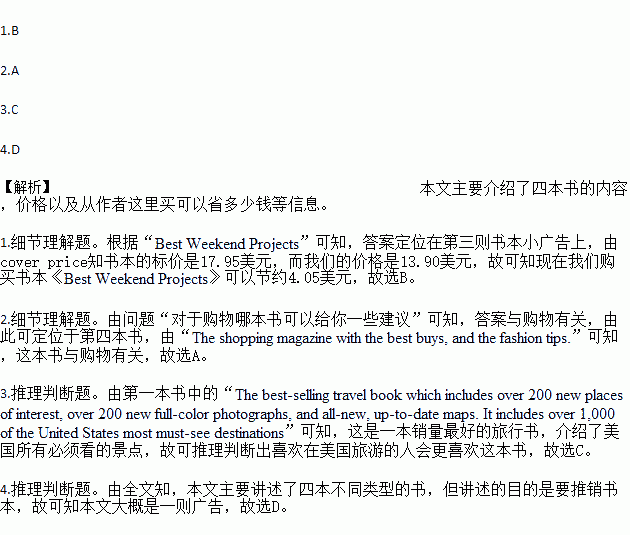题目内容
Off the Beaten Cart Path
The best-selling travel book which includes over 200 new places of interest, over 200 new full-color photographs, and all-new, up-to-date maps. It includes over 1,000 of the United States most must-see destinations
Cover price: $ 30.00
Our price: $ 19.80
Parents
The most popular magazine for parents who want to raise smart and loving children. It has child development guidance, advice on your child’s health and safety, and the best way to encourage your child’s learning.
Cover Price: $ 26.00
Our price: $ 12.60
Best Weekend Projects
The projects are chosen from 80 special ideas to create an unusual living space. They are practical, as well as creative. They will improve your home and yard and can be made on weekends. And the most important of all, they are easy to follow.
Cover Price: $ 17.95
Our price: $ 13.90
Lucky
The shopping magazine with the best buys, and the fashion tips. You’ll need them before you go to the stores. What makes Lucky really special is that it gives you the information you need before anyone else has it.
Cover Price: $ 18.50
Our Price: $ 15.50
1.How much can you save to buy a copy of Best Weekend Projects now?
A. $ 3 B. $ 4.05
C. $ 10.2 D. $ 13.4
2.Which book can give you some advice on shopping?
A. Lucky B. Parents
C. Off the Beaten Cart Path D. Best Weekend Projects
3.Who may like the book Off the Beaten Curt Path most?
A. Ladies loving shopping.
B. Parents with new-born babies.
C. Persons loving traveling in America.
D. Husbands wanting to improve their home.
4.What does the passage most probably belong to?
A. A story. B. A notice.
C. A report. D. An advertisement.

